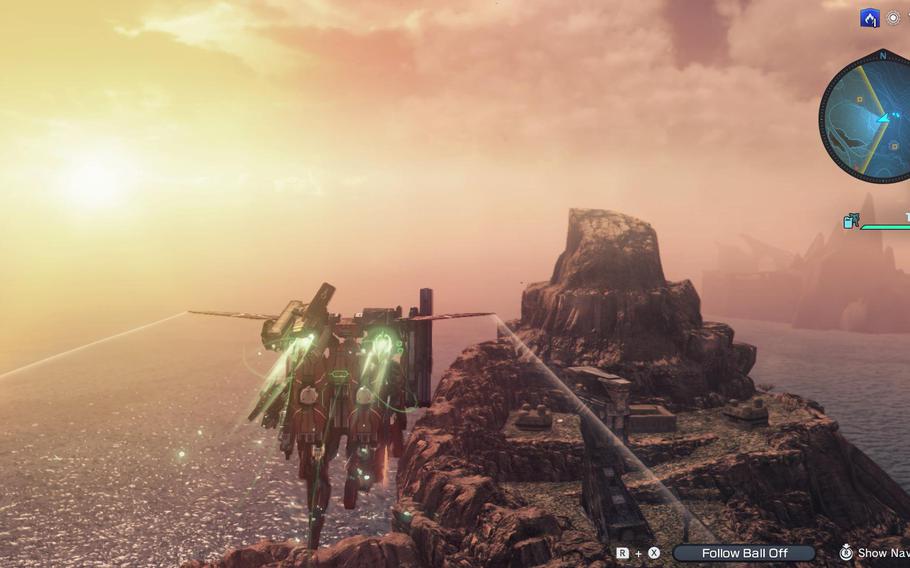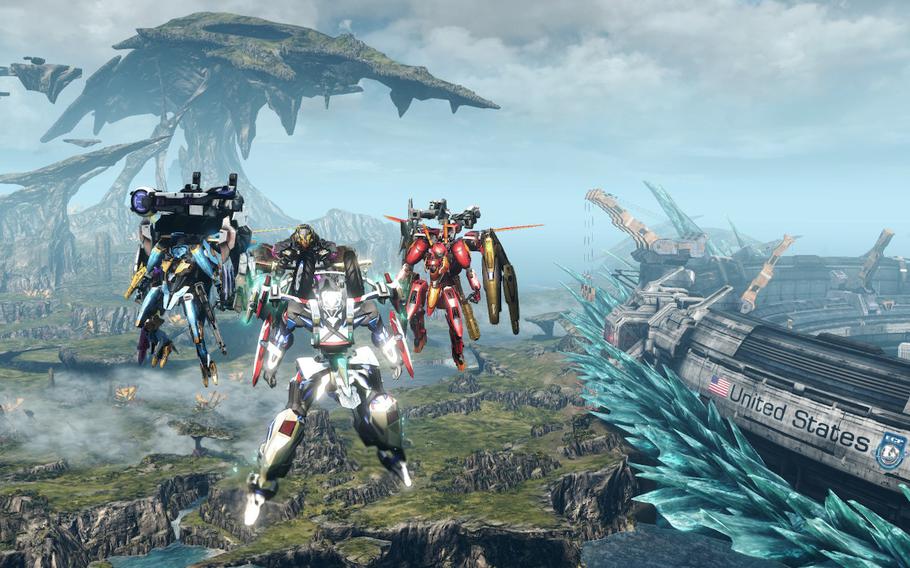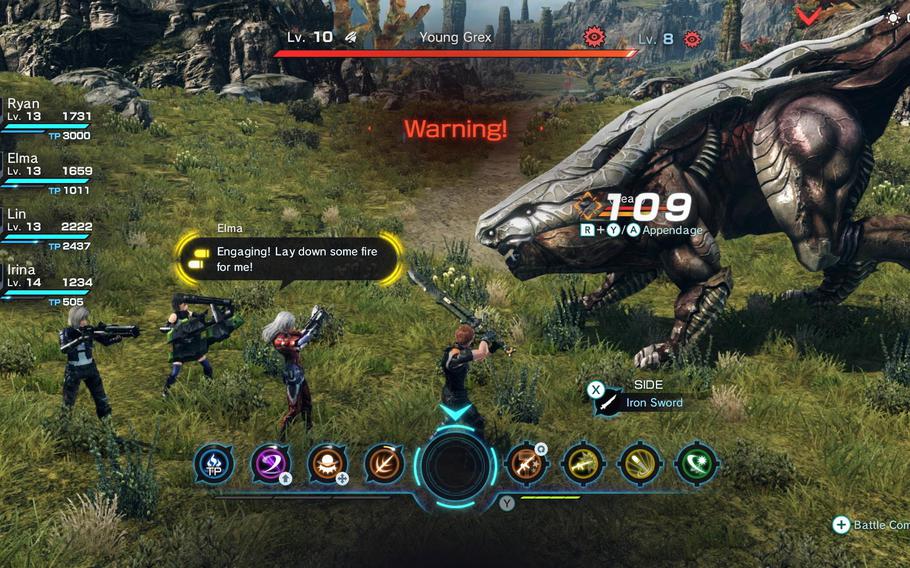
Unfettered exploration defines the Xenoblade Chronicles X experience, allowing flying robots to explore unique locations across five continents in a seamlessly loading alien planet. (Nintendo)
Nintendo is determined to let the world know: Xenoblade Chronicles X has secretly been one of the most influential games of the past 10 years, and it deserves a second chance.
They’re right. In-house studio Monolith Soft released the game in 2015 on the ill-fated Wii U platform, a console that sold only 13 million units. It was a massive, audacious project that demanded the studio’s full attention, yet it was rushed out the door with an incomplete story and messy implementation of online systems, tied down by the Wii U’s tablet gimmick.
This Definitive Edition, released last month [MARCH] on the Nintendo Switch, corrects many missteps. It’s also a strange but fateful full-circle moment for the Switch, by far Nintendo’s most successful console, with more than 150 million units sold. The Switch was an instant success in its 2017 launch year thanks to The Legend of Zelda: Breath of the Wild - a game originally intended for the Wii U, made with help by Monolith Soft staffers, fresh off their experience with the huge open world of Xenoblade.
Now another Wii U game bookends the end of the Switch’s life. Xenoblade X boasts a map at least four times larger than Zelda’s, yet somehow it is the older game. It still plays like a video game from the future, a science fiction role-playing dream come true squarely aimed at fulfilling the most ambitious of space-age fantasies.
The game’s premise is simple: What if Halo was a Japanese role-playing adventure written by the guy whose pitch for Final Fantasy VII was rejected because it was deemed too dark and complicated? Humanity had to flee an Earth destroyed by galactic warfare in a single ship called the White Whale. After a few years of spacefaring, the Whale is forced to land on a mysterious planet, Mira. There, humans encounter alien pieces including one of the forces responsible for Earth’s destruction. Writer and studio founder Tetsuya Takahashi is an alumnus of the Final Fantasy series, but his passion for high-minded science fiction put him at odds, hence why he went independent.

Xenoblade Chronicles X is the rare role-playing game to provide command of a party of battle mechs customizable in color and ability. (Nintendo)
X was created during an era when open-world games were literally pushing the boundaries of video game content. Bethesda Studios’ Skyrim in 2011 was a critical and commercial success. Monolith Soft noticed that Japanese developers were not as enterprising and wanted to match that ambition with its Xenoblade series. The world of X is at least 10 times larger than Skyrim, and in exploring it, the literal sky is the limit.
Japanese fantasy games used to let us explore worlds on flying airships and dragons, but the high-definition era of the early 2000s made that kind of magic tough to re-create. Xenoblade Chronicles X is a bold and successful attempt at translating that magic to a seamless world of five continents littered with varying ecosystems, vast networks of underground caves with the most dangerous monsters and useful treasure, and even castles taller and larger than any skyscraper. It’s all made possible through the selling point right on the game’s cover: customizable, transforming humanoid robots called Skells.
Piloting a Skell takes a few hours of gameplay, as it’s meant to be a mid-story reward. You’re even forced to take a mundane license test. But once you hit the first transformation from robot to car, the inner child will scream with glee. Skells also add an exhilarating layer to an intoxicating battle system that seems complicated at first blush, but improved tutorials ease players into what’s mostly a color-coded system matching attacks against six distinct elements. There’s battle on foot, and when that fails, escalate things by hopping into a house-size robot against bigger foes.
The battle system is representative of the entire game experience, full of knobs and toggles and switches to tweak. Open-world games are often described as sandboxes. X is a sandbox of systems, letting players become as powerful as they want with any weapons or robots they want, paired with up to 22 endearing characters with stories told through a complex web of quest chains that require attention, especially because the wrong dialogue choice significantly changes outcomes in many stories and character fates.

The battle system in Xenoblade Chronicles X is intoxicating in its flexibility and power it gives to a committed player, allowing almost boundless customization. (Nintendo)
This Definitive Edition also adds about 20 to 30 hours of story content, finally ending the 2015 game’s incomplete story. It’s a meaty section of content with new characters to grow “affinity” with (this game’s version of a relationship system), along with epic combat scenarios and heroic denouements the original release sorely needed. The game doesn’t quite have the budget to tell its story with Final Fantasy production values - most of it is told through on-screen dolls gabbing away - but the text itself is compelling, and much of the game’s side adventures are the highlight of the writing. Like Skyrim, this is a game for self-starting players.
Although the new story answers pretty much every hanging question left from the original game, I do wish it was written with more surprise. Takahashi’s writing taps into oft-cited Jungian psychology but has always presented it in compelling ways rooted in character drama. He attempts that here (Xenoblade stories are known for twists), but there are signs that the story was simplified a bit. It’s still an immensely satisfying end because of where our characters land.
One can appreciate how the low-end production allows for such expansive gameplay, with a huge menu of powerful mechanics and equipment for the player. But I was left hoping for a tighter ship anyway, particularly when it comes to the looping music. The soundtrack by famed anime composer Hiroyuki Sawano is eclectic and infectious, but restarting the loop of his pop tracks could sour the listener, particularly in a game with so many battles.
There’s poetry in the Switch ending its life with a Wii U title that inspired its first big hit. But beyond that, I’ve spent 170 hours of the past month playing what’s become one of my favorite gaming experiences of all time. In that time, I grew from a rookie soldier struggling mightily against field rats to felling a god in less than a second. It is the most alluring example of progression fantasy in the past decade.
Platform: Nintendo Switch
Online: tinyurl.com/4yawpyxc